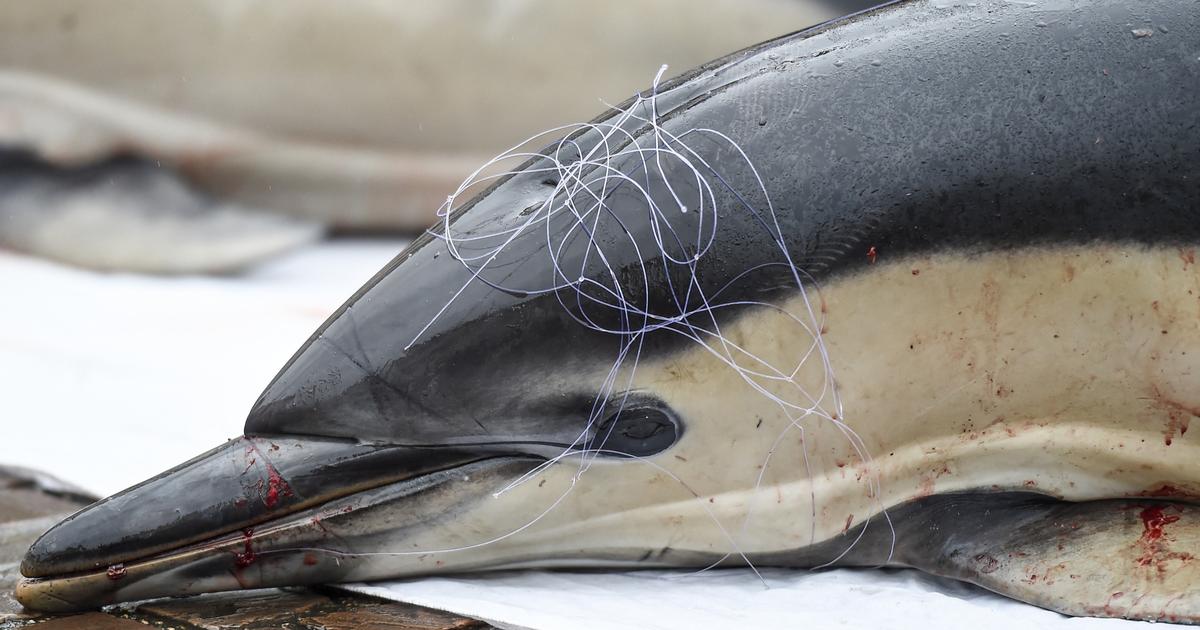Le Figaro Bordeaux
To discover
Follow all the news of the city of Bordeaux
The Bay of Biscay unwittingly becomes the symbol of the massacre of dolphins, a protected and endangered species that often finds itself trapped in the nets of fishing vessels.
In just two days, the weekend of March 11-12, the change in wind direction deposited 120 dead dolphins on French beaches, notes the Pelagis Observatory, attached to the CNRS.
A figure which could even be revised upwards, specifies the institution.
Dozens of remains added to a first bloody salvo: between December and January, 360 corpses had been listed.
A carnage which led the President of the Republic to speak on this subject, during a trip to the Agricultural Show.
"
This is a problem that I take very seriously, I am shocked, but I am while remaining very respectful of our fishermen
," said Emmanuel Macron on February 25.
"
We need to improve our practices
," acknowledged the head of state.
Read also Stranded dolphins: 15 deputies ask the government to act
The day before, the public rapporteur of the Council of State had suggested “
combining the use of acoustic deterrent devices with spatiotemporal closure measures
”, and this within six months.
A decision by the Council of State is expected shortly and could lead to the closure of certain fishing areas in the Bay of Biscay.
But, in the wake of this official awareness of the Head of State, 130 cetacean corpses were again discovered on the coasts between February and March, before the episode this weekend.
According to the associations, this slaughter must push the State to act more quickly.
“A strategy of procrastination”
The League for the Protection of Birds (LPO) reacted on Wednesday, saying that "
once again, the visible traces leave no doubt that these marine mammals were captured by fishing nets in which they are died of asphyxiation, unable to come to the surface to breathe
”.
Worse still, according to the association, "
the corpses found represent only the 'stranded' part of the iceberg, the majority disappearing at sea without ever being discovered
".
For the president of the LPO, Allain Bougrain-Dubourg, the government is implementing a “
strategy of procrastination
”, pending the decision of the Council of State.
"
Every day lost leads to the death of dozens of dolphins.
It is both irresponsible and unbearable
”, he explains, believing that a measure is necessary: “
suspend fishing practices responsible for catches
”.
Read alsoGlobal warming: these “feedback loops” that could have devastating effects
On Tuesday, activists from the Sea Shepherd association deposited seven dolphin remains in front of the European Parliament in Strasbourg, demanding immediate action from the public authorities.
On the spot, the MEP and former environmental candidate in the presidential election, Yannick Jadot, exchanged with the activists.
According to him, these thousands of annual deaths are the result
of “fishing methods
”.
For Pelagis, the link between fishing and dolphin mortality is indeed “
an irrefutable reality
”.
According to the scientific organization, “
the 'incidental' fishing catches of marine mammals are the greatest direct source of their mortality in the world.
In the Bay of Biscay, the situation of dolphin strandings caused by fishing has been particularly critical since 2016
”.
In the winter of 2019 alone, around 11,500 dolphins died there.
“Fools who do anything at sea”
However, prohibiting fishing in this area would not be a good idea, according to the National Committee for Maritime Fisheries and Marine Farming (CNPMEM).
"
If we want it to be effective, we should close the entire Bay of Biscay to fishing for three months
", warns the organization, a closure which would amount to saying "
that there is no more fishing sector in France
”.
This organization warns of the economic repercussions that this would have, for fishermen and for all related trades, because “
one job at sea is three or four jobs on land
”.
"
There are fools who do anything at sea
", recognizes however the CNPMEM, which represents the profession.
But these few fishermen, at the origin of disembowelled or scarified dolphins, would however only be a minority.
When a dolphin is trapped in a net, the law obliges sailors to report this accidental capture and release it.
For fear of criticism, some fishermen still fail to declare the capture of a dolphin, even if the organization considers that "
things are going in the right direction
" in this regard.
Read alsoAround the Garonne, the water war has begun
Several measures will also be put in place between 2023 and 2024, as part of the National Action Plan for the Protection of Cetaceans initiated by the government.
"
For us, the worst solution would be to close the door to the search for technical solutions
", explains David Milly, director of the producer organization Les Pêcheurs d'Aquitaine.
He recalls that three types of devices, tested on a smaller scale, will be placed on nearly half of the 500 gillnetters in the Gulf, between 2023 and 2024.
In particular, “
pingers
” will be installed on the hull of 130 ships in 2023. These beacons only work when spinning and help keep dolphins away.
An acoustic beacon will also be placed in the nets of 63 ships, in order to emit signals perceived by the dolphins, to keep them away.
Finally, 20 ships will be affected by reflectors, a kind of rope crossing each mesh of the fishing net, creating an echo so that the dolphin can visualize the trap, thanks to its acoustic recognition.
In addition, one hundred ships will be equipped with cameras in 2023, five times more than currently.
So many signs that would attest that fishermen "
want to find technical solutions for cohabitation
", believes David Milly, although this experimentation is made compulsory.
He hopes that the data collected will be able to improve fishing practices, without leading to area closures.

